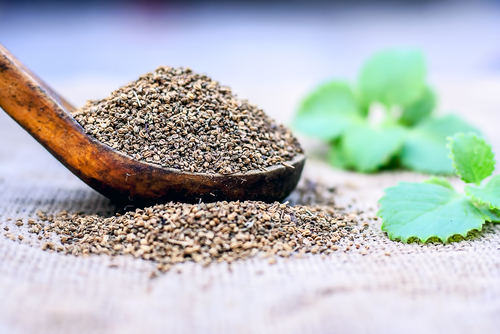Ajwain, a popular spice in South Asian and Middle Eastern cooking, has gained global recognition for its distinctive taste and medicinal properties. But if you’ve come across this name and are wondering what it’s called in English or how to use it, you’re not alone. This guide will explore everything you need to know about ajwain, including its English translation, its benefits, and its versatile applications in cooking and health remedies.
What Is Ajwain in English?
Ajwain is known as carom seeds in English. Sometimes, it is also referred to as bishop’s weed, although “carom seeds” is the more widely used name. Despite being called “seeds,” ajwain is actually the small fruit of the plant Trachyspermum ammi, which belongs to the Apiaceae family (the same family as cumin, dill, and parsley).
Carom seeds are easily recognisable by their small, oval shape and ridged texture. They are greyish-green and have a sharp, bitter, and slightly peppery flavour, often compared to thyme but with a more pungent profile.
Why Is Ajwain Used?
Ajwain is a staple spice in many kitchens, particularly in Indian, Pakistani, and Middle Eastern households. But this tiny seed is much more than just a culinary ingredient. Here’s why ajwain is cherished around the globe:
- Culinary Ingredient
Its bold flavour makes it a key addition to dishes like breads, curries, and snacks such as pakoras and samosas. Ajwain is also commonly toasted or fried in oil to release its aroma and enhance its taste.
- Medicinal Properties
Ajwain is highly valued in traditional medicine systems like Ayurveda and Unani. Known for its digestive benefits, it’s often used as a home remedy for bloating, indigestion, and stomach pain.
- Versatile Uses
From seasoning to home remedies for colds and coughs, ajwain is a versatile addition to your pantry and first aid kit.
Benefits of Ajwain
Ajwain, or carom seeds, offers numerous health and culinary benefits. Its popularity isn’t just cultural tradition – there’s substance behind its reputation. Here are some key benefits:
1. Aids Digestion
Ajwain is rich in thymol, a compound that supports the secretion of gastric juices, improving digestion and alleviating bloating, gas, and indigestion. Many people chew a pinch of raw ajwain seeds after a heavy meal to promote digestion.
2. Relieves Respiratory Issues
Ajwain is often used in home remedies for colds and coughs. Its anti-inflammatory and antimicrobial properties help ease nasal congestion and throat irritation. A steaming bowl of water infused with ajwain can work wonders for breathing issues.
3. Supports Weight Loss
Combined with a balanced diet, ajwain water (prepared by boiling ajwain seeds in water) is believed to enhance metabolism, aiding in weight management.
4. Antimicrobial Properties
Ajwain has natural antibacterial and antifungal properties, making it an effective remedy for infections, both internal and external.
5. Provides Pain Relief
The seeds are sometimes used in topical treatments for joint pain, toothaches, and muscular discomfort. When ground into a paste and applied to the affected area, ajwain can offer immediate relief.
How to Use Ajwain in Cooking
Ajwain is quite potent, so a little goes a long way. It’s essential to use it thoughtfully to avoid overpowering a dish. Here are some common ways to incorporate ajwain into your meals:
- Tadka or Tempering
Heat ajwain seeds in oil or ghee to release their flavour before adding them to lentils, curries, or flatbreads.
- Baking
Ajwain is used extensively in baking savoury breads, crackers, and biscuits, especially in Indian cuisine.
- Spicing Up Snacks
Add ajwain to traditional snacks like pakoras, samosas, or fritters for an extra flavour kick.
- Ajwain Tea or Water
Boil a teaspoon of ajwain seeds in water to make a warm beverage that can help with digestion and cold symptoms.
- Pickles
Ajwain is often added to pickles to act as a preservative and enhance the tart, spicy taste.
Ajwain vs Other Similar Spices
If you’re new to ajwain, you might wonder how it compares to spices like cumin, fennel, or thyme. While these spices share some similarities, their flavours are distinct. For example:
- Ajwain vs Thyme
Ajwain contains thymol, which gives it a taste remarkably similar to thyme but far stronger.
- Ajwain vs Cumin
Cumin is earthy and warm in comparison to ajwain’s sharp and bitter notes.
- Ajwain vs Fennel
Fennel seeds are sweet and anise-like, making them almost the opposite of ajwain.
While substitutes like thyme can work in a pinch, it’s hard to replicate the robust character of ajwain in cooking.
Frequently Asked Questions About Ajwain
What is ajwain called in Arabic?
Ajwain is referred to as Kamoun Jabet or Nankhwah in Arabic-speaking regions.
Is ajwain the same as oregano?
No, ajwain and oregano are different herbs, though they share a similar flavour profile due to their thymol content. Ajwain has a much bolder and spicier flavour.
Can ajwain water reduce bloating?
Yes, ajwain water is a renowned home remedy for bloating and enhancing digestion. Simply boil a teaspoon of ajwain in water, strain, and drink.
Where can I buy ajwain in the UAE?
Ajwain is widely available in supermarkets and spice markets across the UAE, especially in areas with South Asian or Middle Eastern grocers.
What is the shelf life of ajwain?
When stored in an airtight container in a cool, dark place, ajwain can retain its flavour and potency for up to a year.
